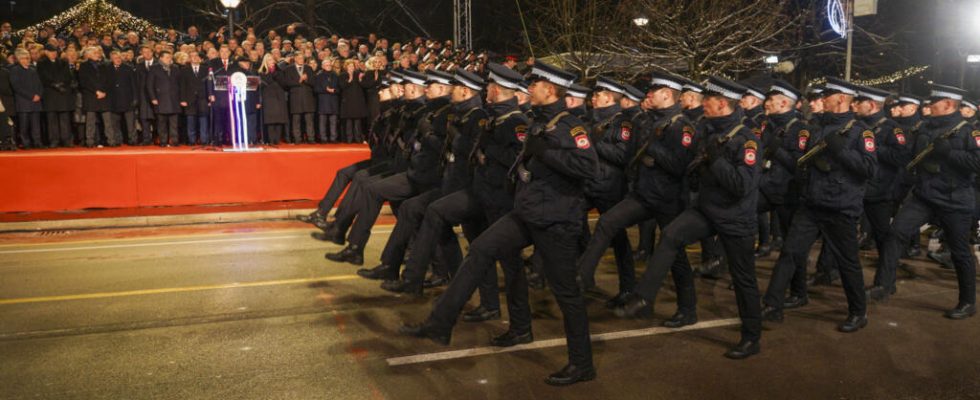4 mins
The Bosnian Serb entity once again celebrated with great fanfare its “national holiday” of January 9, however illegal since 2016, in the presence of many officials from Serbia. After Vladimir Putin last year, it was Viktor Orbán, another close friend of his president Milorad Dodik, who was in the spotlight this time. Nationalist provocations increased before the ceremonies, particularly near Srebrenica.
The Republika Srpska has been engaged in a secessionist process for many months and this ceremony was yet another opportunity for Milorad Dodik to mark his proximity to Belgrade and his distance from Sarajevo.
This is a reminder of the extent to which Bosnia-Herzegovina remains torn between Bosnian, Serbian and Croatian nationalism. A political impasse which contributes to exacerbating the massive exodus of its active forces. Is there still a future for this emptying country? Interview with Timur Vilić, a young activist opposed to nationalism.
Relaunching the integration of the Western Balkans
For several months, the European Union has relaunched the process of enlargement to the Western Balkans. A change of approach after long years of blockage which can be explained above all by the new geopolitical context linked to the war in Ukraine.
When he was Prime Minister and then President, between 2008 and 2022, Borut Pahor was one of the main architects of the reopening of Slovenia to the Balkans. Today, the social democratic leader is launching a Friends of the Western Balkans Foundation with the aim of helping these six candidate countries accelerate their European integration. Our correspondent in Ljubljana met him, exclusive interview.
The rise of the far right
Within the Western Balkans, conservative and nationalist currents are on the rise, with Viktor Orbán’s Hungary as their claimed model. For the New Year, the presidents of Bulgaria, Hungary and Serbia published a joint declaration to defend the values of the traditional family. Vladimir Putin had preceded them: in November, the master of the Kremlin decreed 2024 “ year of the family in Russia “.
In Croatia too, far-right ideas are asserting themselves more and more strongly as the country prepares for a “super electoral year” 2024, with in addition the European elections in June, legislative elections in the wake and then the presidential election in December. The year started with a bad racist rumor, symbol of identity tensions, against Nepalese immigrants, who are arriving in increasing numbers in the country to compensate for the lack of labor. In Romania, a poll has caused a lot of ink to flow in recent days: almost half of people think that life was better during the communist dictatorship… A nostalgia which above all testifies to fear of the present. The Romanian population is increasingly susceptible to far-right populism, which has mastered the art of exploitation. Analysis.
Other consequences of the war in Ukraine
Now led by pro-Europeans, Moldova hopes to move quickly towards its European integration. As such, the Chișinău authorities are increasing pressure against Transnistria. Since January 1, the pro-Russian separatist region must pay Moldova taxes on its imports from the European Union (EU).
On Thursday, the Turkish, Bulgarian and Romanian defense ministers concluded their “Trilateral Initiative” in Istanbul to fight against floating mines proliferating in the Black Sea. This agreement, at the initiative of Ankara which is at the forefront of the Naval Mine Countermeasure Group in the Black Sea, comes at a time when risks are increased for maritime traffic.
New Year’s tradition
On January 6, Orthodox Christians celebrate the baptism of Christ by jumping into the often icy water of lakes and rivers. In Kalofer, in central Bulgaria, the poet Hristo Botev, born January 6, 1848, is also celebrated, and men dance the horo in the waters of the Toundja. Report in images.
During the Cold War, Yugoslavia was one of the leaders of the Non-Aligned Movement. As such, the Titoite Federation has greatly exported its know-how to Africa, particularly architectural. Built in 1977, the Lagos International Fair, Nigeria, brutalist masterpiece, gets a new life. The developments of this exceptional architectural complex were exhibited in the Serbian pavilion at the 18th Venice Architecture Biennale.
